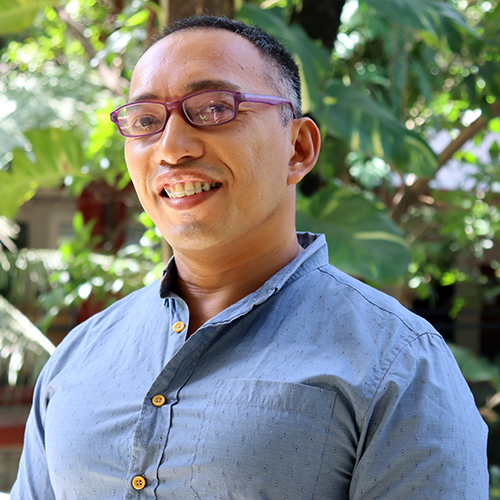
Rogelio Alicor L. Panao, PhD
Associate Professor
rlpanao@up.edu.ph
Google Scholar
Rogelio Alicor L. Panao is an Associate Professor in the Department of Political Science, University of the Philippines Diliman. He finished his Bachelor of Arts in Political Science and Master of Industrial Relations degrees in UP Diliman. He would later earn another Master’s degree in Public Administration, and a Doctor of Philosophy (Arts and Science Program) with Political Science as area specialization, from the International Christian University in Tokyo, Japan. His doctoral dissertation titled “Beyond roll calls: Bill authorship and executive-legislative dynamics in the Philippine House of Representatives” examines how the Philippine executive dominates legislative policymaking as an agenda-setter through the exercise of constitutional and residual powers. His research interests are legislative politics, Philippine executive-legislative relations, labor economics, and political economy.
Education
- Doctor of Philosophy, Graduate School of Arts and Science, International Christian University, Tokyo, Japan, 2013.
- Master of Public Administration, Graduate School of Public Administration, International Christian University, Tokyo, Japan, 2005.
- Master of Industrial Relations, School of Labor and Industrial Relations, University of the Philippines, Diliman, 2000.
- BA (Political Science), College of Social Sciences and Philosophy, University of the Philippines, Diliman, 1996.
Research Interests
Legislative dynamics, Executive-legislative relations, Electoral politics, Institutional reform, Political economy
Recent Publications
- Pernia, Ronald A., and Rogelio Alicor L. Panao. (forthcoming). The Cuss That Cares? Paternalistic Cussing in Rodrigo Roa Duterte’s Presidential Rhetoric. In Feldman, Ofer, (ed.). Dissing and Derision: Political Leaders’ Vulgar Rhetoric and Ridicule around the Globe. Springer.
- Panao, Rogelio Alicor L., and Ranjit Rye. 2023. Junctures in the time of COVID: Topic search and government’s framing of COVID19 response in the Philippines. Asian Journal of Comparative Politics. https://journals.sagepub.com/doi/abs/10.1177/20578911231156083
- Panao, Rogelio Alicor L. 2023. “Do transfers deter local revenue? Unconditional transfers and local fiscal governance in the Philippines. In Atienza, M. E. L, and Tadem, T. E, (eds). Towards Responsible Local Governance, Decentralization, and Equitable Development in the Philippines: Policy Research for Metro Manila. Palgrave.
- Pernia, Ronald A., and Rogelio Alicor L. Panao. 2022. Delegative democratic attitude and public opinion on human rights: empirical evidence from the Philippines, Democratization. doi: 10.1080/13510347.2022.2141229
- Panao, R. A. L., & Pernia, R. A. (2022). Fear and Loathing or Strategic Priming? Unveiling the Audience in Duterte’s Crime Rhetoric. Journal of East Asian Studies, 22(1), 77-98. doi:10.1017/jea.2022.1
- Blanco, Dennis V. & Panao, Rogelio Alicor L. (2022). The sustainable development governance initiatives of Quezon City, Philippines: An analysis of its enablers and barriers. International Journal of Public Administration. Ahead of print, p. 1-19. https://doi.org/10.1080/01900692.2022.2043366
- Panao, Rogelio Alicor L. 2021. Unconditional Transfers and Fiscal Autonomy. In Farazmand A. (ed.) Global Encyclopedia of Public Administration, Public Policy, and Governance. Springer, Cham. https://doi.org/10.1007/978-3-319-31816-5_4137-1
- Mendoza, Gabrielle Ann S. and Panao, Rogelio Alicor L. 2021. Does public approval shape news? Competing legitimacies and news headlines in the Philippines from Ramos to Aquino III. International Journal of Asia Pacific Studies 17(1): 29–55. https://doi.org/10.21315/ijaps2021.17.1.2
- Panao, Rogelio Alicor L. 2020. The Uneasy Relationship Between Labour and Digital Trade. In Digitalisation, trade, and geopolitics in Asia, 73-100. Tokyo, Japan: Konrad Adenauer Stiftung Japan Office.
- Panao, Rogelio Alicor L. 2020. Beyond Flypaper: Unconditional Transfers and Local Revenue Generation in the Philippines, 1992–2016, International Journal of Public Administration, DOI: 10.1080/01900692.2020.1759628
- Panao, Rogelio Alicor L. 2019. Does the upper house have the upper hand?: The dynamics of distributive policies in the Philippine Senate. Philippine Political Science Journal, 40(3): 201-229.
- Panao, Rogelio Alicor L. 2019. Electoral persistence and the quality of public policies: Evidence from the dynamics of lawmaking in the Philippine House of Representatives, 1992-2016. Journal of Asian Public Policy. DOI: 10.1080/17516234.2019.1571731
- Blanco, Dennis, and Rogelio Alicor L. Panao. 2019. Caring for the orphan in the Philippines: A policy capacity review. Child and Youth Services. DOI: 10.1080/0145935X.2018.1551723
- Panao, Rogelio Alicor L. 2019. Laws and jurisprudence as gauge of constitutional efficacy. In M. E. L. Atienza, ed., Chronology of the 1987 Philippine Constitution, pp. 19-44. UPCIDS Public Policy Monograph. Quezon City: UPCIDS and the International Institute for Democracy and Electoral Assistance (International IDEA).
- Panao, Rogelio Alicor L., and Bea Xandra De Leon. 2018. Balancing the interests of labor and capital: An empirical analysis of Philippine Supreme Court labor cases from 1987 to 2016. Philippine Political Science Journal 38(1): 24-46.
- Panao, Rogelio Alicor L. 2016. Tried and tested? Dynastic persistence and legislative productivity at the Philippine House of Representatives. Asian Politics and Policy 8(3): 394-417
- Panao, Rogelio Alicor L., and Jan Robert Go. Eds. 2015. Assessing the Tuwid na Daan. Quezon City: UP Center for Integrative and Development Studies.
- Panao, Rogelio Alicor L. 2014. Beyond roll call: Executive-legislative relations and lawmaking in the Philippine House of Representatives. Philippine Political Science Journal 35(1): 59-77.
Courses Taught
- Political Science 11 (Introduction to Political Science)
- Political Science 14 (Philippine government and politics)
- Political Science 110 (Political Analysis)
- Political Science 130 (Political Science 170: Introduction to Comparative Politics)
- Political Science 134 (Politics of East Asia)
- Political Science 135 (Political parties and social movements)
- Political Science 152 (Philippine legislative system)
- Political Science 157 Special Topics in Philippine Politics (Public Office and Accountability)
- Political Science 188 (International Political Economy: Theories and Issues)
- Political Science 199 (Research design in political science)
- Political Science 201 (Theories and approaches in the study of Philippine politics)
- Political Science 210 (Advance Political Analysis)
- Political Science 283 (International Political Economy)
- Political Science 299 (Graduate Seminar on Research Design)
- Social Science 103 (Statistics for the social sciences)
- Social Science 203 (Advance statistics for the social sciences)
